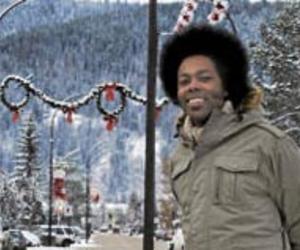Alex Cuba, from Latin hotbeds to Canadian winters – and loving it
- Submitted by: manso
- Arts and Culture
- 12 / 14 / 2010

GUY DIXON. From Tuesday's Globe and Mail. There are many assumptions you could make about Alex Cuba.That he must feel out of his element living in Smithers in the B.C. Interior, given that he’s originally from Cuba. Or that at least he must feel cut off from his Latin audience.Or,surely, that he must curse the snow falling outside his window.Alex Cuba: Si Pero No
Presume this, and you’ll be wrong on every count.
On Cuba’s first day back with his family after a month-long U.S. tour, and just after his Grammy nomination for best Latin pop album was announced, winter in Smithers has set in. It’s much colder than Miami and the other Latin hotbeds he just played. But Cuba, who goes by Alexis Puentes off stage, finds the remoteness of Smithers and the winters an inspiration rather than a dampener.
“I guess I was born to live in Canada. People don’t understand with three feet of snow outside how I can write [music] as much as I write,” he says with a heavy accent. But, he adds, “I will say that I have the only afro in town, so that makes it easy to know who I am, you know?”
In fact, it was by moving to British Columbia with his Canadian wife Sarah Puentes – first to Victoria in 1999 and then to Smithers – that Cuba ultimately found his style and his sound.
It helped to have a well-established support system in Smithers. His wife is the daughter of former provincial assemblyman Bill Goodacre; her great-grandparents settled in the area before the town was even incorporated as a municipality. “We’re related to half the town,” Sarah Puentes says.
That meant family was on hand to help out while the couple set up their own label, Caracol Records. And the community (which includes everyone from American draft dodgers to government workers) is known for welcoming outsiders. But Cuba says the feeling of newness coming to Smithers, and to a new country, was what ultimately inspired him to find a new musical direction – a mix of pop, funk and blues with a Cuban base.
That sound has clearly paid off. Cuba has already won a Latin Grammy and multiple Juno awards. Still, he says he was surprised by his Grammy nomination (awards night is Feb. 13), particularly since it’s in recognition of a Latin sound that’s uniquely his, and which came to him after leaving Cuba.
“The ones who understand it first are the ones who don’t have anything to do with Cuba,” he says. For those without Latin musical roots, his songs, sung mostly in Spanish, may sound generally Cuban. But for those brought up on strict diet of tangos, Cuban son (literally, the Cuban sound) and Guantanamera, his rhythmic melodies are as far from tradition as Smithers is from his home island.
“I decided to find my own colours in the palette, paint pictures with my own colours. Let people think later what [best describes] my music,” he says. “But my music speaks really well with second-generation, third-generation Latins in the U.S.
People who speak perfectly both languages, Spanish and English, my music is just their taste. ... To them, they see it as the missing element on the Latin chain, that they can show to their totally Anglo friends and be proud.”
Cuba, 36, met his wife while on tour in Vancouver in 1995. They married later that year in Cuba, on Christmas Day (which wasn’t an official holiday on the island at that time), and eventually moved to B.C., joined by Cuba’s brother Adonis.
At home, Cuba played bass, mainly jazz. And he’d been discouraged from singing by his classically trained father because his voice isn’t the clarion of typical Cuban singers.
But in Canada, singing increasingly became a calling for him. As did his own Latin sound. Although his brother was initially cautious, suggesting Canada was too removed from Latin audiences, Cuba saw it differently. He believe that if it was original music, audiences would come. Even if he sang in Spanish, people would understand the emotions and message.
“I stuck to that. I still think that way. I still live here, and I will never move away from here,” says Cuba. “People go beyond their own language when you give them something to believe in.”
In fact, what makes Cuba increasingly popular, even with traditionalists, is that he isn’t the norm, but is using Cuban ingredients. “My music to them is not Cuban as they are used to, which is an interesting thing. And I’m very aware of that.
I know what it is to be Cuban. I did an album with my brother at the beginning of my career in Canada which was very traditional, that was Cuban.”
Now home for the holidays with his three children, Cuba sees the shortened winter daylight not as something to endure, but as conducive to his work. “To me, it’s more time for music! More time to focus on what you have to do! To me, it’s an opportunity. I come from a country where everything is about parties and being happy, opening your door and playing music loud.”
And he doesn’t need the heat of Cuba to sustain him, he says.
“Inside my soul, let me tell you, it’s warm in there when I want it to be.”
Source:www.theglobeandmail.com/news/arts/music/
Comments